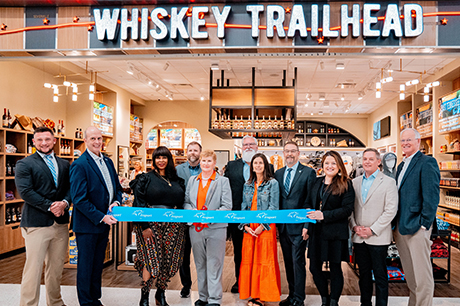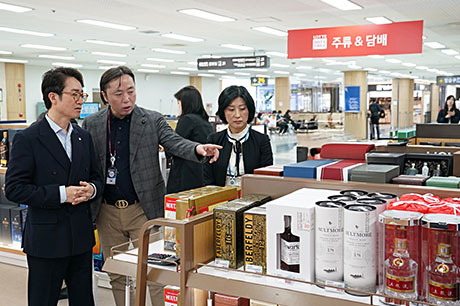Survey 2024: Avolta’s Rossinyol on the path ahead
By Luke Barras-hill |

World Duty Free at Heathrow Airport.
Avolta Chief Executive Officer Xavier Rossinyol has said he is observing positive shifts towards more pliable, equitable concession contracts based around principles of shared risk and reward, with landlords and tenants forging tighter partnerships in the face of travel market fluctuations and uncertainty.
In an exclusive interview carried in the 20th anniversary edition of the TRBusiness Global Industry Survey, the man at the helm of the powerhouse travel retailer talks emerging markets growth, new airports and infrastructure expansion, and how Avolta is catering to a new wave of younger, travel-savvy, socially conscious shoppers hungry for digitalisation and personalisation.
How would you assess the travel retail industry in 2023?
Throughout 2023, we have seen the continued willingness and desire of people to travel, and as a result our business has continued its positive momentum. Alongside this, new consumer behaviours, digital transformation and an increased focus on sustainability revealed themselves as strong themes across the year.
For Avolta, the traveller is at the heart of everything we do and our goal is to make each trip as rewarding as the destination. The ongoing close collaboration of concession partners, brand suppliers and retail operators has, therefore, continued to be a key success factor in helping to provide our customers with a seamless travel experience, that is memorable for all the right reasons. We welcome this spirit of true partnership continuing as we move forward, including the willingness to find new shopping formats as well as contractual frameworks.

Xavier Rossinyol, Chief Executive Officer, Avolta.
What are your expectations for your business in travel retail in 2024?
There is a lot to look forward to in 2024. We are seeing a lot of expansion in terms of new airports and infrastructure, driven by the ongoing and increasing demand for travel. Emerging markets such as Asia and Africa, for example, are seeing significant growth in travel driven by their expanding and younger populations and their increased wealth.
The focus on sustainability will continue to be a more significant factor within the wider industry, with consumers increasingly seeking sustainable products and practices. We also expect to see more hybrid formats emerging as a favourite for travellers and landlords alike. The combination of retail and food & beverage is something unique and helps to deliver a more holistic experience for travellers and amplifies the all-important sense of place within the airport environment.
Alongside this expansion, the increased focus on digitalisation will continue and help the wider industry to offer more seamless and personalised shopping experiences. The integration of advanced technologies like AR and VR in shopping experiences – which we have already seen some great examples of – will continue, as will the use of technology to help improve logistics, provide more enhanced e-commerce platforms, and take customer service to yet another level.
What do you think will be the biggest challenges facing the DF&TR industry in 2024?
The industry as a whole is going through a period of significant change and this change is happening fast. Consequently, one of the main challenges is keeping pace with all the developments and new demands. That is why Avolta is committed to conducting so much of its own ongoing research, tapping into our network of 5,500 points of sale globally, to help us identify and understand new and emerging trends and customer behaviours. And of course with its global reach the industry is impacted by events all around the world: currency fluctuations, economic uncertainty, and geopolitical tensions. We need to remain vigilant as these macroeconomic and political challenges most likely will persist.
And what do you expect will be the biggest opportunities for the DF&TR industry in 2024?
The consumer and traveller mix is changing and driving new and different behaviours which have to be catered to – for example the increasing interest in seeking experiences and experience-based goods, or the ongoing demand for hybrid, wellbeing, sustainable and healthy product offers. To maximise these many opportunities requires a strategic, adaptable approach, and that is what our transformative Destination 2027 [strategy] is all about.

La Mer boutique at Shanghai Hongqiao Airport.
Put simply, travellers are looking for a more individualised offer of products and services, which cater for their personal needs and preferences at any specific moment of their journey, and with a holistic perspective that encompasses F&B and retail. With our Destination 2027 strategy we can create the relevant solutions and offers that people are wanting and make travellers happier by delivering a holistic travel experience throughout their whole journey.
The experience of the pandemic exposed the inflexibility of minimum annual guarantees, with many in the industry believing fixed rents should give way to more versatile, risk-sharing contracts. Are you seeing evidence that the concession model is changing, for better or worse?
There were indications that the concession model was evolving in response to the challenges exposed by the pandemic, particularly the inflexibility of minimum annual guarantees. Consequently, we are now seeing positive movement towards more adaptable and risk-sharing contracts and, above all, a stronger emphasis on partnership between landlords and tenants, recognising that collaboration is key to navigating uncertainties and fluctuations in the travel market.
Does ‘greenhushing’ – organisations choosing to deliberately downplay or mask their sustainability or ESG credentials for fear of public scrutiny – pose a greater risk to travel retail’s development than greenwashing?
Consumers increasingly expect transparency and authenticity in sustainability efforts and with this growing emphasis on sustainability in consumer behaviour – especially in the travel sector – both greenwashing and greenhushing pose risks in different ways. Greenwashing may pose a more immediate and tangible risk due to the potential for significant consumer backlash and reputational damage, while greenhushing can undervalue the positive contributions a company is making in terms of sustainability and ESG and thus undermine a company’s long-term potential, and its alignment with market trends
towards sustainability.
Looking specifically at the travel industry – where brand reputation is crucial and customers are increasingly environmentally conscious – greenwashing can lead to a loss of customer loyalty and a decline in sales, while greenhushing could mean missing out on opportunities to connect with the growing segment of environmentally conscious consumers. It could also suggest a lack of transparency, which could also be concerning for travellers.
Avolta’s ESG strategy is an inherent part of the company strategy, Destination 2027, and it’s also fully aligned with the role Avolta plays in the travel retail eco-system, and is regularly revised to ensure it remains relevant and meets the evolving needs of our industry. Our ESG developments and ethics are widely recognised across the main players of our business environment – employees, investors, suppliers, and customers.

Mind. body. soul shop-in-shop concept at London Stansted Airport.
And our strong commitments, such as the establishment of emission target reductions in line with the Science Based Targets initiative (SBTi), the preparation of our TFCD Report (Task Force on Climate Related Financial Disclosures) published in Q1 of 2023, and our commitment towards protecting Human Rights as a signatory member of the UN Global Compact, are all strong testimonials to the importance Avolta places to ESG, and give transparency to all that we are doing in this vital area.
Some would argue that the increase in passenger spend per head witnessed in recent years is reflective of increases in retail pricing linked to higher costs within the supply chain. At some point, consumers will push back on rising prices and softening demand in some categories illustrates this is already taking place. If we agree that it is not the responsibility of any one party to shoulder all the costs, how does the industry approach this dilemma?
To navigate the challenges of rising costs and changing consumer spending habits requires a holistic approach that involves cost management, consumer engagement, collaboration, and innovation. As you have mentioned, no one party can shoulder all the responsibility and costs. First and foremost, developing a business model that is resilient to economic fluctuations and is sustainable in the long term is crucial. This includes diversifying revenue streams, and being adaptable to changing market conditions – all of which are key elements of our Destination 2027 strategy.
This article first appeared in the Global Industry Survey 2024, carried within the TRBusiness January e-zine. To read in full, click here.
Rossinyol spoke to TRBusiness in an exclusive two-part video interview that took place on location at last year’s TFWA World Exhibition & Conference in Cannes. To revisit the exchanges in full, see the Part 1 and Part 2 video links above.
READ MORE: January ezine + landmark Annual Survey
READ MORE: Lotte Duty Free talks expansion and capturing FIT spend
TR Consumer Forum: Agenda & speakers revealed
Influential speakers will unpack the most effective strategies for understanding and engaging...
Saudia Arabia's KKIA unfurls T3 duty free expansion
King Khalid International Airport (KKIA) has unveiled the first stage of its much-vaunted duty...
OUT NOW: March/April Leading Americas Operators
The TRBusiness March/April 2024 edition boasting the inimitable leading Americas Operators...
-
 International,
International,TR Consumer Forum: Agenda & speakers revealed
-
 International,
International,Saudia Arabia's KKIA unfurls T3 duty free expansion
-
 International,
International,OUT NOW: March/April Leading Americas Operators

In the Magazine
TRBusiness Magazine is free to access. Read the latest issue now.

 Trbusiness. The travel retail Trbusiness. The magazine for global retail and duty free professionals.
Trbusiness. The travel retail Trbusiness. The magazine for global retail and duty free professionals.





















